by Prudence Caskey | Aug 31, 2023

Who can participate in the NW District Chick Chain Project?
4-H Youth ages 5-18 from the Northwest District of Florida can enroll and participate in the NW Florida 4-H Chick Chain project. Those counties include Bay, Calhoun, Escambia, Franklin, Gadsden, Gulf, Holmes, Jackson, Jefferson, Leon, Liberty, Okaloosa, Santa Rosa, Wakulla, Walton, and Washington.
What is the Chick Chain project?
Join 4-Hers from our 16-county Northwest Extension district and learn how to raise and care for chickens. At the end of the project, there’s a district show where you’ll show off your birds and everything you’ve learned. This website will support you throughout your project. (more…)

by lauenc | Jun 30, 2023
As summer approaches and the days grow longer, it’s the perfect time to engage 4-H youth in outdoor activities that blend fun, learning, and teamwork. One exciting way to accomplish this is to organize a tailgating (grilling) camp and grilling exhibition in preparation for your District 4-H Tailgating Contest. 4-H Agents and volunteers have a unique opportunity to guide young participants in the art of grilling while instilling valuable life skills and fostering a sense of camaraderie. In this blog post, we will explore the benefits of incorporating a tailgating (grilling) competition into your summer programming.

Building Life Skills: Grilling is not just about cooking delicious food; it also teaches various life skills that are essential for personal and professional growth. By incorporating a tailgating competition into your summer programming, you can help young participants develop skills such as teamwork, leadership, communication, time management, and problem-solving. These skills are valuable in all aspects of life and will benefit them in the long run.
Fostering Creativity: Tailgating competitions offer a platform for youth to unleash their creativity. Encourage participants to come up with unique recipes, experiment with flavors, and showcase their grilling techniques. This will not only boost their confidence, but also stimulate their culinary imagination. Remember to emphasize the importance of food safety and hygiene throughout the process.
Encouraging Healthy Eating: While contest participants are limited to pork, beef, chicken, and shrimp during the actual competitions, you can use the tailgating competition as an opportunity to promote healthy eating habits among youth. Encourage participants to incorporate nutritious ingredients such as lean proteins, fresh vegetables, and whole grains into their recipes. Teach them about the benefits of balanced meals and provide resources on how to make healthier choices when grilling.
Creating a Sense of Community: Organizing a tailgating competition brings people together and creates a sense of community among participants. Encourage teams or individuals to share their grilling experiences, techniques, and recipes with one another. This fosters a supportive environment where everyone can learn from each other and build lasting connections.
In June 2023, Holmes County 4-H added another element to their annual 4-H Tailgating Summer Day Camp by including a public grilling exhibition and competition. The event was held in conjunction with Peppertown Market, a monthly community-wide street market in downtown Bonifay. Holmes County 4-H youth had an opportunity to hear constructive criticism and words of encouragement from judges and volunteers as they competed for a spot at the Northwest District Tailgating Contest. The grills and youth were strategically placed to create a high impact opportunity to boost awareness of Holmes County 4-H. Event attendees had the opportunity to speak with 4-H volunteers and the 4-H Agent to obtain resources and learn more about Holmes County 4-H. Volunteers also utilized the event as a fundraising opportunity by selling peach cobbler made in a Dutch oven on location near our 4-H youth that were grilling. Proceeds were used to offset the costs associated with the Tailgating Camp and Grilling Exhibition.
Incorporating a tailgating camp and grilling exhibition into your summer programming offers numerous benefits for youth development. By teaching grilling skills, fostering creativity, promoting healthy eating, and creating a sense of community, you can inspire young participants to embrace outdoor cooking as a lifelong hobby. Remember to prioritize fire safety, provide access to reliable resources, and encourage participants to explore various grilling techniques. With your guidance, they will light the fire for grilling success and create memorable experiences that extend beyond the summer months.
The 2023 Florida 4-H Northwest District Tailgating Contest will be held in Chipley, Florida on July 22, 2023. Winners from the each of the District contests will be invited to compete at the State Contest on Saturday, September 23, 2023 in Gainesville, Florida.
Contact your local 4-H Agent and visit Tailgate Contest – Florida 4-H – University of Florida, Institute of Food and Agricultural Sciences – UF/IFAS (ufl.edu) to explore a wide variety of informative resources that can help “spark” a passion for food science and fire safety.
- Region 1 | Northwest District Contest
| Key Questions |
Information |
| When |
Saturday, July 22, 2023 |
| Where |
Washington County Agricultural Center, 1424 Jackson Ave, Chipley, FL 32428 Counties |
| Registration |
May 5 to July 15, 2023 |
| Grill Setup |
Grill setup will be from 9:15 a.m. CDT to 10 a.m. CDT with grills starting at 10:15 a.m. CDT. |
| Counties |
Bay, Calhoun, Escambia, Franklin, Gadsden, Gulf, Holmes, Jackson, Jefferson, Leon, Liberty, Okaloosa, Santa Rosa, Wakulla, Walton, Washington |
| Coordinators |
Mark Mauldin, mdm83@ufl.edu, & Brian Estevez, bestevez@ufl.edu |
by Marcus Boston Jr. | Apr 26, 2023
Youth shows and fairs provide a valuable opportunity for young people to develop a wide range of life skills. From responsibility and communication to planning and organization, these events offer a unique learning experience that can help young people build important skills for success in all areas of life.
Can a youth’s participation in County fairs and Shows help to develop them into responsible adult? The answer is yes! The Florida 4-H Program seeks to be inclusive to all youth by using a variety of vehicles to teach youth life skills in traditional and non-traditional settings. A recent article in The Journal of Extension by Oregon State professionals found that “having fun” “spending time with friends” and “teamwork” were the highest-rated motivators for youth that participated in fairs.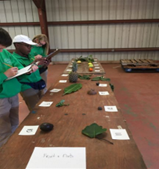
The study also revealed that participation in fairs through 4-H had a significant positive effect on participants’ levels of caring, contribution, and character. These characteristics are also part of the Essential Elements of 4-H that youth experience by being in an active 4-H program throughout the year. Those elements are Belonging, Independence, Generosity, and Mastery.
One of the most important skills that youth learn through participation in youth shows and fairs is responsibility. Whether they are caring for animals, plants, or other projects, youth must take on the responsibility of ensuring that their projects are healthy, well-cared for, and ready to be presented to judges and visitors.
 Communication is another key skill that youth develop through participation in youth shows and fairs. Through active participation youth learn the ability to articulate complex ideas, listen actively, and respond thoughtfully to questions and feedback.
Communication is another key skill that youth develop through participation in youth shows and fairs. Through active participation youth learn the ability to articulate complex ideas, listen actively, and respond thoughtfully to questions and feedback.
In addition to these skills, youth shows, and fairs also emphasize important values such as sportsmanship and fair play. Participants are encouraged to respect their competitors, accept both victories and defeats graciously, and uphold the highest standards of ethical behavior. This helps young people develop important social skills, including the ability to work collaboratively with others and build positive relationships.
Finally, participation in youth shows and fairs can help young people develop resilience and perseverance in the face of challenges and setbacks. These events can be competitive and stressful, but they also offer opportunities for young people to learn from failures, bounce back from disappointments, and remain motivated to achieve their goals.
A few of the Florida 4-H Shows and Fairs are as follows:
-
- State 4-H Dairy Show Okeechobee March
- 4-H Chick Chain Show Chipley April
- Area North Horse Show Green Cove Springs May
- North Florida Fair Tallahassee November
*For additional opportunities to participate in 4-H Shows and fairs please contact your local 4-H office.
In conclusion, participation in youth shows and fairs can offer a unique and valuable learning experience for young people. By developing important skills such as responsibility, communication, planning, and organization, as well as important values such as sportsmanship and fair play, youth can build the foundation for success in all areas of life.
References:
More information on this study can be obtained by visiting the Journal of Extension at www.joe.org and viewing volume 45, number 6.(Arnold, Meinhold, Skubinna, and Asthton)
by Marcus Boston Jr. | Apr 13, 2023
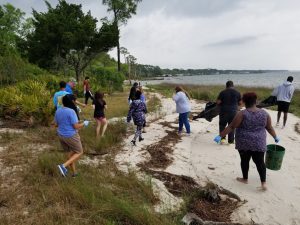 Life skills for youth are defined as a set of abilities and competencies that enable young people to successfully navigate their daily lives and achieve their goals. These skills are essential for personal and professional development and help “prepare youth to be responsible citizens and productive members of the workforce.” Florida 4-H provides many opportunities for young people to obtain life skills through project work, community and afterschool clubs, workshops, and leadership programs.
Life skills for youth are defined as a set of abilities and competencies that enable young people to successfully navigate their daily lives and achieve their goals. These skills are essential for personal and professional development and help “prepare youth to be responsible citizens and productive members of the workforce.” Florida 4-H provides many opportunities for young people to obtain life skills through project work, community and afterschool clubs, workshops, and leadership programs.
As a state-wide organization, Florida 4-H prioritizes the development of communication, higher-order thinking, and appreciation of differences. These three life skills are infused throughout our educational activities and programs because they are essential workforce skills. Below are a few examples of local programs that focus on helping youth develop life skills:
- Communication: 4-H provides opportunities for youth to develop their communication skills through the Florida 4-H Public Speaking Contest, demonstrations, and presentations at County/District and 4-H University. These activities help youth learn how to articulate their ideas clearly and confidently.
- Higher Order Thinking: this includes both decision-making and problem-solving.
- Decision-Making: 4-H offers various programs, such as judging contests at fairs, 4-H event planning committees (district/state council), and club activities that help youth develop their decision-making skills. These activities help youth learn how to make informed decisions and evaluate the outcomes of their choices.
- Problem-Solving: 4-H offers various programs, such as STEM projects and engineering challenges, that help youth develop problem-solving skills. These activities encourage youth to think creatively and find innovative solutions to complex problems.
- Appreciation of Differences– 4-H helps youth learn how to respect and communicate with people who might be different from themselves. Many of our programs offer opportunities for youth to meet new people and explore different cultures. We also help youth learn how to address conflict in a positive way through civil discourse. Older youth can participate in exchange programs with 4-Hers from other states and countries (4-H is in all 50 states and 32 other countries!).
- Teamwork: Through 4-H club projects, counselor training, and community service activities, youth learn how to work collaboratively with others towards a common goal, which helps them develop important teamwork skills.
- Responsibility: 4-H club projects and community service activities encourage youth to take responsibility for their actions and to learn the importance of following through on commitments.
- Leadership Development: 4-H offers various programs, such as officer training, public speaking, county/district councils, and community service projects, that help youth develop their leadership skills.
- Self-Confidence: 4-H programs provide a safe and supportive environment where youth can build their self-confidence through public speaking, leadership roles, and community service activities.
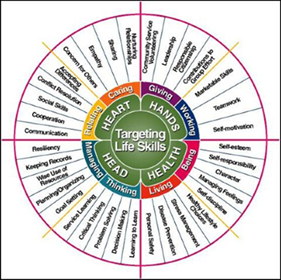
- Service Learning: Through 4-H club work, obtaining a Florida 4-H Community Pride Grant, and active membership on county/district councils, youth members take part in projects and experiences that help them how to become active participants in the communities and apply their experiences to real-life situations.
These are not the only life skills youth in Florida can learn and practice through 4-H- but they are part of almost every program we offer. These are examples of the priority life skills that Florida 4-H promotes among youth, with a focus on cognitive development, interpersonal skills, leadership, civic engagement, and practical skills. Florida 4-H aims to provide a comprehensive youth development program that equips young people with the skills they need to succeed in their personal lives, careers, and communities. Active involvement in 4-H will help members to connect life skills obtained through their 4-H involvement to real-life experiences. For more information on these youth leadership opportunities please contact your local 4-H office.
If you would like to help Florida 4-H teach life skills, or get your child involved in our program, reach out to your local UF/IFAS County Extension Office. There is an office in every county in Florida. Spring is a great time to get involved, because 4-H offers several summer programs for youth to develop life skills!
References:
Marilyn N. Norman and Joy C. Jordan.2018.Targeting Life Skills. EDIS document #4HSFS101.9
Hendricks, P.(1988). Developing Youth Curriculum Using The targeting Life Skills Model
Michigan State Extension. 2016. 4-H Head Life Skill Sheets.(4-H1679)
by Julie Pigott Dillard | Mar 17, 2023
Over 50 4-Hers and over 100 chickens filled the barn and auditorium for the 2023 Northwest District Chick Chain show. The show was culmination of the seven month 4-H Chick Chain project.
At the beginning of the 4-H year, 4-Hers took ownership of day old chicks and began their journey in the 4-H poultry science project. They learned about poultry nutritional and housing needs, how to clean and show their birds, and how to perform health assessments. This program also encourages the development of life skills. Life skills are also known as workforce ready skills – skills that help individuals adapt to and perform in different settings.
Some of those workforce ready skills include:
- Communication – During the project, 4-Hers learned how to perform health checks on their birds. At the show, they conduct a health check for a judge. They explain to a judge how to perform the check, what they are looking for, and why a health check is important. 4-Hers could also choose to participate in Avian Adventures and give a presentation or demonstration on any aspect of poultry science.
- Problem Solving – 4-Hers participated in a skill-a-thon to test what they learned throughout the project. Senior 4-Hers were given scenarios to apply the best care and nutrition practices to meet the given situation.
- Work Ethic – Caring for an animal requires daily attention. 4-Hers fed and watered their animals daily, changed bedding, and prepared for cold temperatures to protect their birds. They also practiced their showmanship skills by frequently handling their birds to ensure they were tame.
- Reading and Mathematics – 4-Hers completed a record book at the end of their project. Their record books documented project goals, what they learned during the project, and animal care tasks. They also completed a financial record of expenses and income throughout the project.
At the show, all 4-Hers participated in poultry showmanship. First-time show participants and Cloverbuds participated in a skill-a-thon to test the knowledge and skills they learned in the project. 4-Hers who participated in last year’s Chick Chain show participated in Avian Adventures giving a presentation or demonstration on any poultry science related topic.
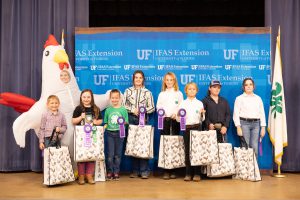
Best of Breed winners
2023 NWD 4-H Chick Chain Show Results
Best of Breed
- Australorp – Kolton Mercer
- Cochin – Emily Flowers
- Delaware – Tate Cannon
- Orpington – Olivia Bruan
- Plymouth Barred Rock – Tate Cannon
- Rhode Island Red – Henry Feinberg
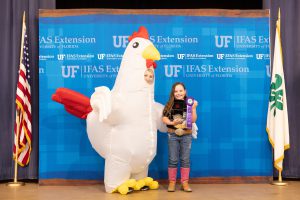
Laura Mae – Grand Champion Pullet
- Sussex – Lily McDaniel
- Wyandotte – Laura Mae Waters
Grand Champion Pullet – Laura Mae Waters
Reserve Champion Pullet – Henry Feinberg
Grand Champion Production – Audrey Stephens
Reserve Champion Production – Kolton Mercer
Showmanship
- 1st place Junior – Julia Newsome
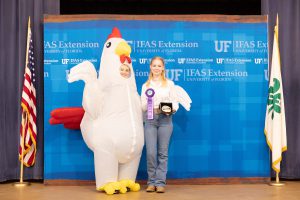
Audrey – Grand Champion Production
- 2nd place Junior – Jackson Scurlock
- 3rd place Junior – Kendyl Reams
- 1st place Intermediate – Julia Mashack
- 2nd place Intermediate – Emily Flowers
- 3rd place Intermediate – Emmit Ackman
- 1st place Senior – Steven Stafford
- 2nd place Senior – Roger Nemeth
- 3rd place Senior – Audrey Stephens
Skill-a-Thon

Julia – 1st place junior showmanship
- 1st place Cloverbud – Aubrey Mauldin
- 1st place Junior – Finn Feinberg
- 1st place Intermediate – Micah Houston
- 1st place Senior – JD Brookhouse
Avian Adventures Demonstration
- 1st place Junior – Allison Collier
- 2nd place Junior – Tate Cannon
- 1st place Intermediate – Kason Mercer
Avian Adventures Illustrated Talk
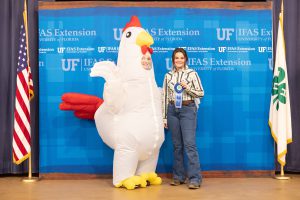
Emily – 1st Place Intermediate presentation
- 1st place Junior – Jocelyn Brock
- 2nd place Junior – Kadence Ackman
- 1st place Intermediate – Emily Flowers
- 2nd place Intermediate – Riley Bolling
- 3rd place Intermediate – Eli Howard
- 1st place Senior – Cat Proud
- 2nd place Senior – Roger Nemeth
- 3rd place Audrey Stephens
To all of our exhibitors, your 4-H Agents and 4-H club leaders would like to say “Great work” and that we enjoyed working with you this year! The 2023-2024 NWD 4-H Chick Chain program will begin in September. For more information, contact your county UF/IFAS Extension office.
A special thank you to Chris Lauen, UF/IFAS Extension Holmes County 4-H Agent, for capturing photos throughout the day. Click to view the entire photo gallery.
by Julie Pigott Dillard | Dec 21, 2022
If you have seen the news, weather, or even talked to your neighbor, then you know, it’s gonna be cold! It is going to be so cold, people from Florida don’t know what to do. Here are a few ideas how to protect your chick chain chicks. During this upcoming cold snap, your chicks will be between two and half to three and a half months old. They are fully feathered out and should be able to handle the weather that is “normal” for our area. The main thing to keep in mind in the next couple of days is that the upcoming weather will not be normal for our area.
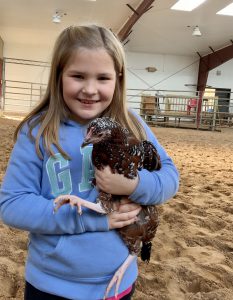
Sussex chickens are a cold-hardy breed. But the coming cold is out of Florida’s norm!
There are several breeds that are hardier to the colder weather. These breeds include: Americauna, Austrolorp, Barnevelder, Brahma, Buckeye, Cochin, Delaware, Dominique, Faverolle, Jersey Giant, Marans, New Hampshire, Orpington, Plymouth Rock, Rhode Island Red, Sussex, Welsummer, and Wyandotte. Now, if you have one of these breeds, it doesn’t mean that you are out of the water. Additional care will need to be taken for all your chicks, no matter their breed.
WATER
Speaking of water, that is one of the main things you will need to be concerned with during the weather that is approaching. “They” are calling for over 34 hours of below freezing temperatures. The main concern for your birds will be heat and water. Your water will freeze over and will need to be checked on several times during the day. Add warm, not hot water to the poultry waterer. If you make it too hot, the chicks may burn themselves. Overnight, it is best to empty the waterers if possible to prevent ice. Refill them in the morning and throughout the day with warm water.
WIND
The strong wind is another concern. The weather advisory is calling the gust of wind that we will experience an “artic blast”. The main thing for your birds is to keep them out of the wind. This does not mean that you need to bring them inside. Simply putting up a block for the north wind will be enough. That block can be a sheet of plywood, some tin or even plastic sheeting. Apply something to the north end of the coop to help keep the wind down. Do not wrap the entire coop, just block the north end. If your coop has a natural north wind block, like bushes or if it is placed on the south side of your garage, you should be fine.
WARMTH
The next item to consider is to give them some warmth. This can be accomplished with a red heat bulb in a clamp light. I found mine on sale at Tractor Supply. The red bulb should be clamped about three to four feet above the floor of the coop. This will prevent any accidental burning of the chicks or the coop. Coop heaters are also available and are safer inside the coop. Another option is hay. Hay will provide warmth for your chicks and help with the chill of the ground. If you use hay, be very careful not to place your heat lamp too close because it could start a fire! The last item to assist with warmth is food. The actual act of eating food will provide warmth to your chicks’ bodies. Make sure they have plenty of food. Remember, scratch or cracked corn is essentially candy for them. Just like any candy, we want to limit how much of that they get. I bet if you mixed a little with their grower crumbles, they would not argue about it.
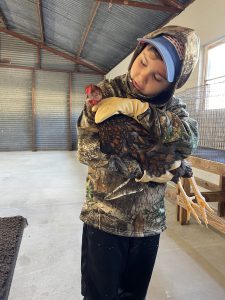 The main thing to remember with this cold snap is that your animals depend on you. Get bundled up and head outside and make sure they have clean, warm water and food. The good news is that we live in Florida and this is only for a couple of days.
The main thing to remember with this cold snap is that your animals depend on you. Get bundled up and head outside and make sure they have clean, warm water and food. The good news is that we live in Florida and this is only for a couple of days.
Enjoy the change in weather and stay warm yourselves.
Prudence Caskey, 4-H Extension Agent II
Santa Rosa County Extension
Institute of Food and Agricultural Sciences
6263 Dogwood Drive
Milton, FL 32570
(850) 623-3868















